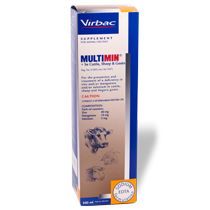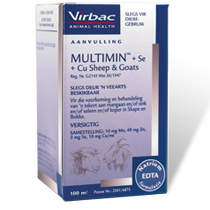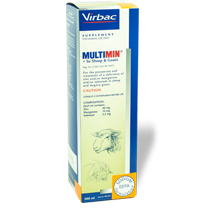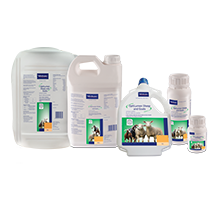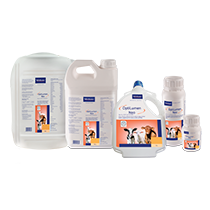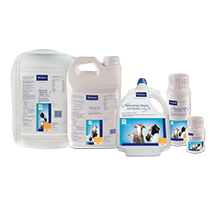SHEEP MANAGEMENT PRE-LAMBING: Trace Mineral Supplementation
This is article 4 of 6 articles on this topic
In order for an ewe to achieve her full genetic potential, as well as that of the unborn lamb(s), certain requirements must be met. One of the most important requirements is trace mineral supplementation. Unfortunately it is often neglected, mainly because trace mineral supplementation does not have an immediate and visual effect. Yet, “behind the scenes”, it plays a critically important role in optimal animal production.
Trace mineral supplementation is important for optimal immunity , growth – especially young ewes and lambs, and reproduction. It is commonly known that the demand for trace minerals drastically increases during pregnancy. Even if the animal is only deficient in one of these minerals, immunity, production and reproduction can be negatively affected. Although a trace mineral deficiency cannot always be observed, it has a significant impact on profitability. The latest trial work from Australia confirmed the benefits of Multimin supplementation with a positive impact on the number lambs at marking (+9%), as well as improved weaning weight (+2.3kg).
Gonzalez-Rivas P.A., Swaney S., Evans R., Chambers M., Liu J. (2021).
Effect of a trace mineral injection before joining and lambing on conception rate, marking rate and lamb weights in diverse farms in Victoria.
The higher the number of unborn lambs the ewe carries, the higher her need for trace minerals. Although oral intake is important (pasture and licks), it is mostly insufficient to meet the ewe’s needs in this high-demand period – and a so-called trace mineral gap occurs. Heavily pregnant ewes’ feed intake is, furthermore, impacted negatively by the limitation of rumen capacity imposed on them by their unborn lamb(s). To overcome this problem, trace minerals can be administered by means of an injection under the skin. A “Top Up” application 4 to 6 weeks before lambing can help meet the needs of today’s high-producing ewes.
Essential trace elements before lambing include manganese (Mn), zinc (Zn), copper (Cu), and selenium (Se). These four trace minerals play an important role in many of the pregnant ewe’s bodily functions. A deficiency in any of these during late pregnancy can have a negative effect on the development and survival of the lamb(s). Trace minerals are transferred from the ewe to the foetus and ensure that lambs are born with optimal levels of trace minerals. Milk does not contain significant quantities of trace minerals, therefore, it is important that lambs are born with an optimal level.
The quality of the colostrum is also affected by the ewe’s trace mineral status during late pregnancy through the effect it has on the number of antibodies in the colostrum. This is important, since it kickstarts the lamb’s immune system and optimises the early (maternal) immunity of the lambs. Research has shown that injectable trace mineral supplementation improves the efficacy of vaccines (Roberts et al., 2016). It holds advantages not only for the ewe, but also for the lambs, thanks to the higher-quality colostrum they consume.
Manganese improves ewes’ fertility. Selenium is important for embryo survival and development. Selenium is also important for optimal immunity and, as mentioned above, leads to lower ewe mortality and a higher weaning mass. Zinc is important for hoof quality (foot rot) and the health and condition of the udder and teats. A shortage can lead to a lower birth mass. Copper can also play a positive role. Around 10% of the copper an ewe takes up is used for wool production. It also plays a role in reproduction and disease immunity, and (along with selenium and vitamin A), a reduction in the incidence of retained placentas. (NB: Supplementing sheep with copper must be approached with care because it could lead to toxicity if the ewes already have an adequate copper status.)
Therefore, we can see that trace mineral supplementation in late pregnancy can play a very important role in many respects and should get the necessary attention. Although oral intake of trace minerals is important – and should be standard practice – an injectable “Top-Up” with Multimin® during this time will help to reduce or eliminate the trace mineral gap and ensure optimal production.


